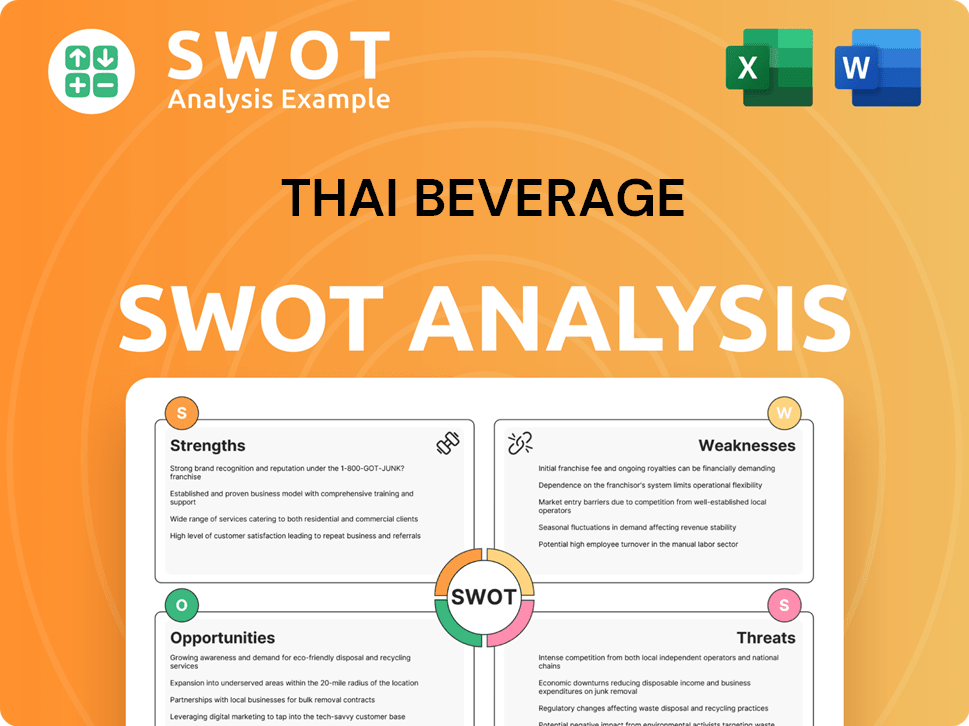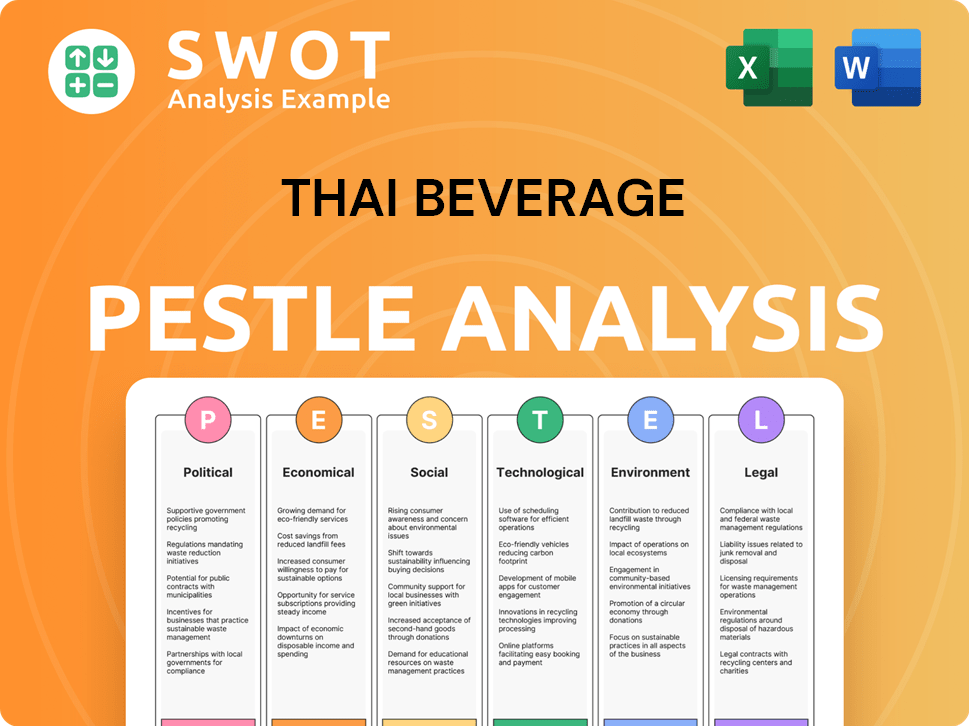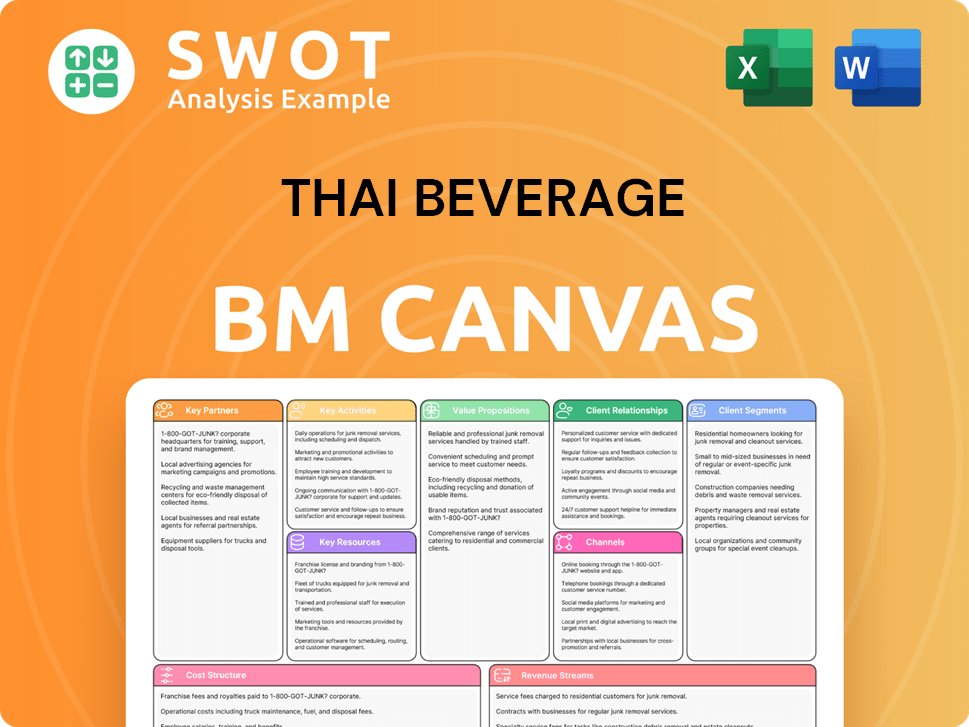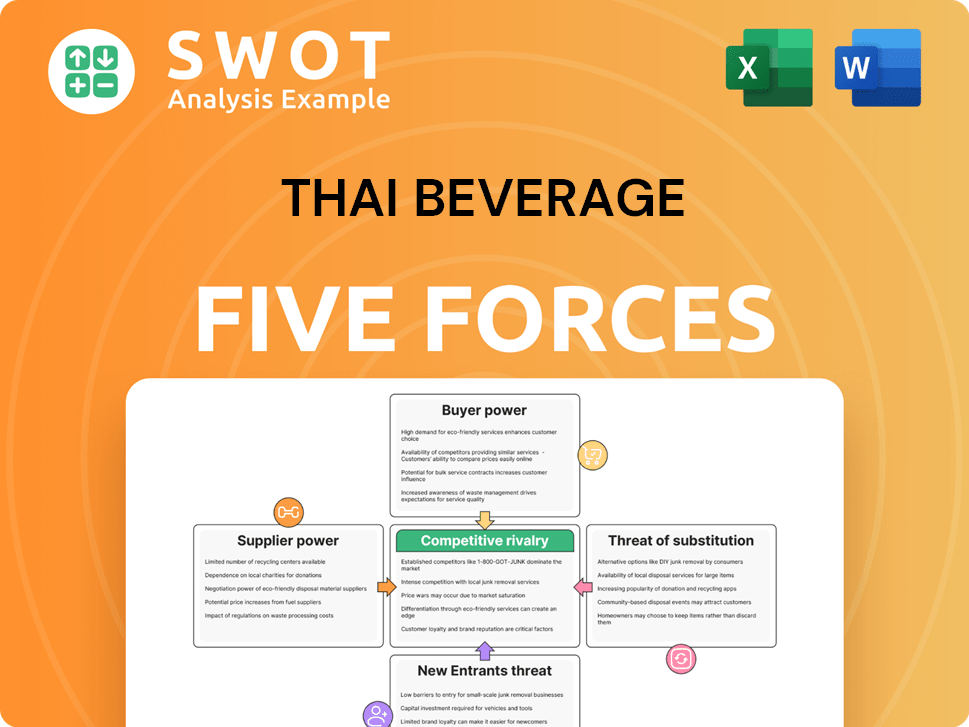Thai Beverage Bundle
Can Thai Beverage Company Maintain Its Dominance?
The Southeast Asian beverage industry is a battleground, and Thai Beverage SWOT Analysis reveals the strategies of a key player: Thai Beverage Public Company Limited (ThaiBev). From its inception in 2003, ThaiBev has transformed from a local alcohol producer into a diversified conglomerate. This evolution showcases its ambition to lead the competitive landscape.

This in-depth analysis explores ThaiBev's position in the beverage industry in Thailand, examining its market share, key competitors, and strategic moves. We'll delve into the financial performance of Thai Beverage Company, its product portfolio, and how it navigates challenges in the market. Understanding the competitive advantages of ThaiBev is crucial for anyone seeking insights into this dynamic sector, including its international expansion plans.
Where Does Thai Beverage’ Stand in the Current Market?
Thai Beverage Company (ThaiBev) holds a strong market position within the Southeast Asian beverage industry, with a particularly dominant presence in Thailand. The company's operations are centered around alcoholic beverages, non-alcoholic beverages, food, and real estate. Its extensive portfolio and robust distribution network contribute significantly to its market share across multiple beverage categories.
ThaiBev's core operations are divided into key segments, including spirits, beer, non-alcoholic beverages, and food. The company's value proposition lies in offering a wide range of products that cater to diverse consumer preferences. This includes popular beer and spirits brands, as well as ready-to-drink tea, coffee, and bottled water. ThaiBev's strategic acquisitions, such as the acquisition of Saigon Beer Alcohol Beverage Corporation (Sabeco), have further strengthened its market position and expanded its geographic reach.
The company's strategic focus has been on diversification and expansion, aiming to capture a wider range of consumer preferences and mitigate risks associated with reliance on a single product category. This has led to consistent financial performance, reflecting its scale and operational efficiency. For example, in 2024, the company showed a strong revenue stream, which is a testament to its robust market position. For a deeper dive into the company's strategic initiatives, consider reading about the Growth Strategy of Thai Beverage.
ThaiBev's market share in the beer and spirits segments in Thailand is substantial. While specific figures fluctuate, the company consistently holds a leading position. In the beer market, Chang Beer remains a key brand, contributing significantly to overall revenue. The company's strong distribution network supports its market dominance.
ThaiBev's influence extends beyond Thailand, with significant operations in Vietnam. The acquisition of Sabeco was a strategic move to bolster its regional footprint. This expansion has diversified revenue streams and reduced reliance on the Thai market alone. The company continues to explore opportunities for growth in other Southeast Asian countries.
ThaiBev's product portfolio includes a wide range of alcoholic and non-alcoholic beverages. Key brands include Chang Beer and various spirits brands. The non-alcoholic segment features ready-to-drink tea and coffee, as well as bottled water. This diversified portfolio helps the company cater to a broad consumer base and mitigate market risks.
ThaiBev has consistently reported strong financial performance, reflecting its scale and operational efficiency. Revenue streams are diversified across multiple segments and geographies. The company's strategic acquisitions and market strategies have contributed to its financial success. In 2024, the company's revenue was approximately $6.8 billion.
ThaiBev's market strategy focuses on brand building, distribution network optimization, and strategic acquisitions. The company aims to expand its product portfolio and geographic presence. These strategies are designed to enhance market share and drive revenue growth.
- Focus on premiumization to increase profit margins.
- Expansion in the non-alcoholic beverage segment.
- Strategic partnerships and collaborations.
- Enhancing operational efficiencies across all segments.
Thai Beverage SWOT Analysis
- Complete SWOT Breakdown
- Fully Customizable
- Editable in Excel & Word
- Professional Formatting
- Investor-Ready Format

Who Are the Main Competitors Challenging Thai Beverage?
The competitive landscape for Thai Beverage Company (ThaiBev) is complex, shaped by its diverse portfolio and geographic reach. The company operates across alcoholic and non-alcoholic beverage segments, facing competition from both global giants and local players. Understanding the competitive dynamics is crucial for assessing ThaiBev's market position and future prospects. A thorough market analysis of ThaiBev reveals the key players and their strategies.
ThaiBev's ability to navigate this competitive environment is essential for its financial performance. The company's market strategy involves a combination of organic growth, acquisitions, and strategic partnerships. The beverage industry in Thailand and Southeast Asia is dynamic, with evolving consumer preferences and regulatory changes impacting the competitive dynamics. The Growth Strategy of Thai Beverage provides further insights into their approach.
The company's revenue breakdown by segment shows the significance of each market. Analyzing the competitive advantages of ThaiBev helps to understand its strengths. The latest news on Thai Beverage Company often highlights its responses to competitive pressures and market trends.
In the alcoholic beverage sector, ThaiBev's primary competitor in Thailand, particularly in the beer market, is Boon Rawd Brewery, the producer of Singha Beer. The two companies have a long-standing rivalry, competing fiercely for market share. The spirits segment sees competition from numerous local distilleries and international brands, especially in premium categories.
The non-alcoholic beverage market sees competition from multinational corporations such as Coca-Cola and PepsiCo. These companies have extensive portfolios of soft drinks, juices, and bottled water. Regional and local brands also present significant competition in specific categories.
The competitive landscape is continually reshaped by the emergence of new players and mergers. Consolidation among smaller breweries and distribution partnerships also impact the competitive dynamics. This requires ThaiBev to remain agile and strategically responsive.
While specific market share data fluctuates, Boon Rawd Brewery and ThaiBev have historically been the dominant players in the Thai beer market. In the spirits segment, the market is more fragmented, with various local and international brands competing for consumer attention. The non-alcoholic beverage market sees Coca-Cola and PepsiCo holding significant shares.
ThaiBev's competitive strategies include brand building, distribution network expansion, and product innovation. Boon Rawd Brewery focuses on brand loyalty and effective marketing. Coca-Cola and PepsiCo leverage their global brand recognition and extensive distribution networks. New entrants often target niche markets or health-conscious consumers.
Government regulations significantly impact the beverage industry. Changes in excise taxes, advertising restrictions, and health-related policies can affect ThaiBev's operations and competitive position. Compliance with these regulations is a key challenge.
ThaiBev faces a diverse and dynamic competitive landscape. Understanding the key competitors, their strategies, and the impact of market trends is essential for assessing ThaiBev's performance. Analyzing ThaiBev's SWOT analysis reveals its strengths and weaknesses in relation to its competitors.
- Boon Rawd Brewery: Primary competitor in beer.
- Coca-Cola and PepsiCo: Key players in non-alcoholic beverages.
- Local Distilleries and International Brands: Competition in the spirits segment.
- New Entrants: Emerging players targeting niche markets.
- Market Dynamics: Influenced by mergers, alliances, and regulatory changes.
Thai Beverage PESTLE Analysis
- Covers All 6 PESTLE Categories
- No Research Needed – Save Hours of Work
- Built by Experts, Trusted by Consultants
- Instant Download, Ready to Use
- 100% Editable, Fully Customizable

What Gives Thai Beverage a Competitive Edge Over Its Rivals?
Understanding the competitive landscape of Thai Beverage Company (ThaiBev) requires a deep dive into its strengths and strategic positioning. ThaiBev, a key player in the beverage industry in Thailand and beyond, has cultivated several competitive advantages that have helped it maintain a strong market presence. These advantages are crucial for investors, analysts, and business strategists seeking to understand the company's potential and navigate the complexities of the beverage market.
The company's success is built on a foundation of strategic moves, including acquisitions and expansions that have broadened its product portfolio and geographical reach. These moves, combined with effective brand management and a robust distribution network, have enabled ThaiBev to capture significant market share. This analysis will explore the elements that define ThaiBev's competitive edge, providing insights into its operations and market dynamics.
Key to ThaiBev's success is its ability to adapt to changing consumer preferences and market trends. This agility, combined with a focus on innovation and operational efficiency, positions the company well for future growth. The following sections will delve into these aspects, offering a comprehensive view of ThaiBev's competitive landscape.
ThaiBev boasts a diverse product range, including alcoholic and non-alcoholic beverages. This broad portfolio allows the company to cater to a wide range of consumer tastes. The varied offerings also facilitate cross-selling opportunities, boosting overall revenue.
A significant advantage is ThaiBev's extensive distribution network, particularly within Thailand and Southeast Asia. This network ensures that its products are easily accessible to consumers. This wide reach is a key barrier to entry for new competitors.
Flagship brands like Chang Beer and various spirits enjoy strong brand recognition and customer loyalty. Years of marketing and consistent product quality have built this brand equity. This loyalty provides a competitive edge in the market.
ThaiBev's large-scale operations provide significant economies of scale in procurement, production, and marketing. This allows the company to maintain competitive pricing. These efficiencies contribute to its profitability.
These competitive advantages have been instrumental in shaping ThaiBev's market position. The company's ability to leverage its established infrastructure and market knowledge has enabled it to penetrate new segments and expand its geographical footprint. For a deeper understanding of ThaiBev's financial performance and business model, consider exploring the insights provided in this article: Revenue Streams & Business Model of Thai Beverage.
ThaiBev's competitive strengths are multifaceted, encompassing a wide product range, a robust distribution network, strong brand recognition, and economies of scale. These factors enable the company to maintain a strong market position. These advantages are critical for success in the beverage industry.
- Diversified Product Portfolio: Offers a wide array of alcoholic and non-alcoholic beverages, catering to diverse consumer preferences.
- Extensive Distribution Network: Ensures product availability across Thailand and Southeast Asia, reaching both urban and rural markets.
- Strong Brand Recognition: Flagship brands like Chang Beer have high brand equity and customer loyalty.
- Economies of Scale: Large-scale operations result in cost efficiencies in procurement, production, and marketing.
Thai Beverage Business Model Canvas
- Complete 9-Block Business Model Canvas
- Effortlessly Communicate Your Business Strategy
- Investor-Ready BMC Format
- 100% Editable and Customizable
- Clear and Structured Layout

What Industry Trends Are Reshaping Thai Beverage’s Competitive Landscape?
The competitive landscape for ThaiBev is dynamic, influenced by evolving consumer preferences, technological advancements, and regulatory changes. Understanding the industry trends, future challenges, and opportunities is crucial for assessing ThaiBev's strategic positioning and potential for future growth. The company faces both internal and external pressures that require continuous adaptation and innovation to maintain and enhance its market share.
Analyzing the competitive landscape of Thai Beverage Company, or ThaiBev, reveals a complex interplay of market forces. The company's strategic decisions are significantly impacted by consumer behavior, government regulations, and the actions of its competitors. A deep dive into these factors is essential for a comprehensive ThaiBev market analysis.
The beverage industry in Southeast Asia is experiencing significant shifts. Urbanization and a growing middle class are increasing demand for both alcoholic and non-alcoholic drinks. There's a notable trend towards healthier options, premium products, and sustainable sourcing, influencing product innovation and portfolio diversification for companies like ThaiBev.
ThaiBev faces challenges such as evolving consumer preferences, increased competition, and regulatory hurdles. Adapting to the demand for healthier beverages and premium products is crucial. Stiff competition from both local and global players, along with changing government regulations, adds to the complexity of the market.
Opportunities for ThaiBev include expanding into emerging Southeast Asian markets, innovating in non-alcoholic and health-conscious segments, and forming strategic partnerships. Capitalizing on rising disposable incomes and changing lifestyles presents significant growth potential. Strategic moves, like the investment in Sabeco, can strengthen regional presence.
To remain competitive, ThaiBev should focus on portfolio diversification, enhancing digital capabilities, optimizing its supply chain, and exploring strategic collaborations. These strategies are essential to navigate the evolving landscape and capitalize on future growth prospects. The Marketing Strategy of Thai Beverage provides additional insights.
The beverage industry in Thailand, and the broader Southeast Asia region, is influenced by several key elements. These include evolving consumer tastes, technological advancements, and the impact of government regulations. Understanding these dynamics is essential for effective market analysis of ThaiBev and its competitors.
- Consumer Preferences: There is a growing demand for healthier and premium beverage options, influencing product innovation.
- Technological Advancements: Digital marketing, supply chain optimization, and production technologies are reshaping the industry.
- Regulatory Environment: Regulations concerning alcohol sales and marketing present ongoing challenges.
- Competitive Intensity: Competition from local craft breweries and global giants intensifies the market.
Thai Beverage Porter's Five Forces Analysis
- Covers All 5 Competitive Forces in Detail
- Structured for Consultants, Students, and Founders
- 100% Editable in Microsoft Word & Excel
- Instant Digital Download – Use Immediately
- Compatible with Mac & PC – Fully Unlocked

Related Blogs
- What are Mission Vision & Core Values of Thai Beverage Company?
- What is Growth Strategy and Future Prospects of Thai Beverage Company?
- How Does Thai Beverage Company Work?
- What is Sales and Marketing Strategy of Thai Beverage Company?
- What is Brief History of Thai Beverage Company?
- Who Owns Thai Beverage Company?
- What is Customer Demographics and Target Market of Thai Beverage Company?
Disclaimer
All information, articles, and product details provided on this website are for general informational and educational purposes only. We do not claim any ownership over, nor do we intend to infringe upon, any trademarks, copyrights, logos, brand names, or other intellectual property mentioned or depicted on this site. Such intellectual property remains the property of its respective owners, and any references here are made solely for identification or informational purposes, without implying any affiliation, endorsement, or partnership.
We make no representations or warranties, express or implied, regarding the accuracy, completeness, or suitability of any content or products presented. Nothing on this website should be construed as legal, tax, investment, financial, medical, or other professional advice. In addition, no part of this site—including articles or product references—constitutes a solicitation, recommendation, endorsement, advertisement, or offer to buy or sell any securities, franchises, or other financial instruments, particularly in jurisdictions where such activity would be unlawful.
All content is of a general nature and may not address the specific circumstances of any individual or entity. It is not a substitute for professional advice or services. Any actions you take based on the information provided here are strictly at your own risk. You accept full responsibility for any decisions or outcomes arising from your use of this website and agree to release us from any liability in connection with your use of, or reliance upon, the content or products found herein.